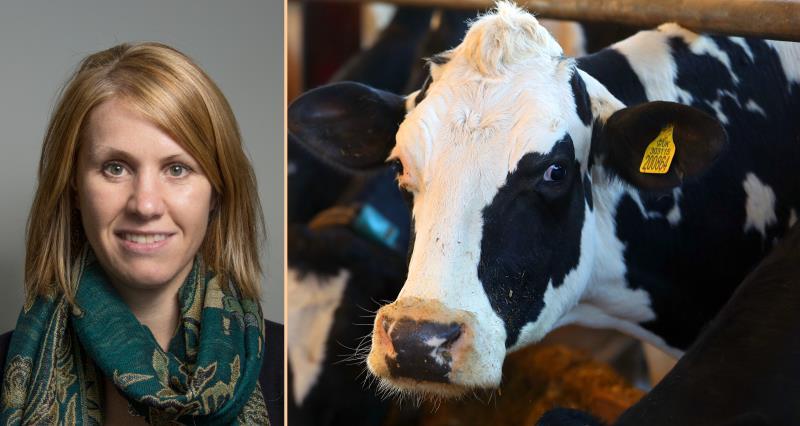This week Dairy Board Chairman Michael Oakes and Chief Adviser Sian Davies travelled to Brussels to the annual European Dairy Association policy conference. Below Sian shares the highlights of the conference:
The European Dairy Industry’s Dairy Policy Conference this week was aptly titled European Dairy – Our Way Forward. Last year’s focus was completely on Brexit and the impact that would have on the European dairy “lactosphere” as it’s called in EU dairy circles. This year the EDA tried to look ahead but both Tom Tynan, Irishman and member of Agriculture Commissioner Phil Hogan’s cabinet and Arla’s EU Chief Peter Gioritz – Carlsen brought us back to the main issue facing them at the moment. On the other hand, it was interesting that the other two speakers – Bulgaria’s Deputy Agriculture Minister Dr Tzvetan Dimitrov and Jacques Creyssel from the French retailer association - didn’t mention Brexit once. That’s the actual situation in Brussels – many member states and their associations just want to get on with the job in hand – the current review of the CAP and the budget (the Multiannual Financial Framework or MFF for short) regardless of Brexit, whilst for others it’s vital to get the divorce deal right.
So what was actually discussed? Bulgaria currently hold the chair of the European Council so were asked about their priorities for their 6 month term. On farming this is very much progressing the current CAP discussions and protecting small, family farms. In Bulgaria dairy is the largest farming sector after arable, but they produce milk from cows, sheep, goats and buffalos.
Tom Tynan’s priority for the next 6 months is also the CAP but that this current review is an evolution not a revolution. But he started on a cautious note on Brexit – the trade of dairy between the EU and the UK is worth €625 billion. It’s vital that all countries work towards the best deal possible as free and frictionless trade is vital. The UK is the second biggest economy in the world, it’s the 3rd biggest dairy importer globally and the 2nd biggest dairy importer in the EU. The impact of the UK leaving the EU cannot be ignored. Custom controls in imports and exports will be a massive shock but they cannot be negotiated upon – they are the guardian of the single market and what provides assurance to consumers inside and outside the EU. He was also strong on the role of the European Court of Justice, a key red line for the UK Government. “The ECJ has been beneficial for UK farmers. In 2006 when the EU banned the importation on British beef due to the BSE crisis. In 2009 the ban was lifted but two key countries, Germany and France maintained national bans. The ECJ overturned these bans. That is the strength of the ECJ.”
Moving onto the CAP, rural poverty is seen as a major issue across the EU. CAP provides part of the answer to this – farming educates and creates jobs which drags people out of poverty. At minimal cost. The total cost of the Multiannual Financial Framework is 1.13% of gross national income –less than half a cup of coffee a day – and CAP is only 40% of the MFF – so a small contribution for what it delivers – world leading standards and a vibrant rural economy based on family farms.
And then exports. The EU is now the biggest trading block in world, with half it’s GDP based on exports. EU exports are now valued at €138billion, and that was against a headwind (the value of the $). Overall the EU has a €20.5 million positive trade balance and agricultural exports create over 22,000 jobs. Dairy products make up over half the EU agricultural trade surplus – it’s a hugely positive success story.
On a more sobering note Arla’s Peter Gorlitz-Carlson shared some depressing stats on dairy consumption under the heading “the goodness of milk is being questioned”. In the UK liquid milk consumption is down 3%yet dairy alternative sales are up 1% . In Denmark 55% of consumers are confused by dairy health messages and 19% of young adults are following a dairy-free diet. We need to challenge these myths with actual facts.
Facts such as “milk production in western Europe is far more efficient than in sub Saharan Africa”, milk emissions per kg nutrition or the actual nutrient density of milk compared to soya drink.
But to Arla there’s a bigger challenge. Brexit. As we know the food and drink sector is biggest manufacturing sector in the EU with a value of €1 trillion. The UK will be a third country but a “vital 3rd country”. How will the EU displace the 2.7billion kg of milk equivalent that is currently exported to the UK? Can it be managed internally without causing price volatility? Will this shortage lead to higher prices in the UK? The best option for the UK and the EU dairy sector is an FTA without tariffs and minimal non-tariff barriers.
The key priorities for EU dairy as Arla sees them are:
- Counter misinformation
- Re-establish dairy as a good habit?
- Create excitement about dairy?
- Best possible Brexit solution
And on that note I’m going to remind you all of the #departmentofdairyrelatedscrumptiousaffairs and encourage you all to get involved in creating excitement about the UK dairy sector. Because you only get what you put in….

